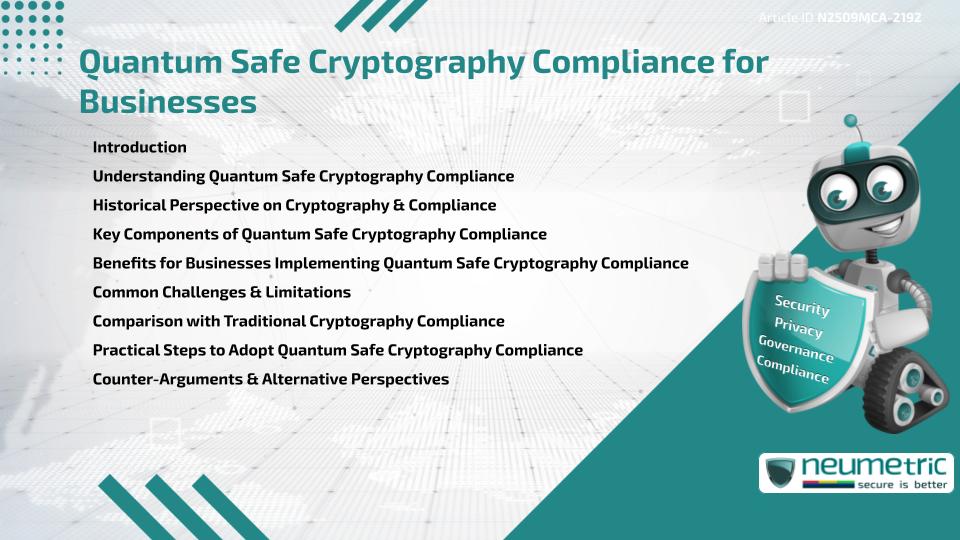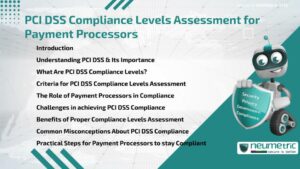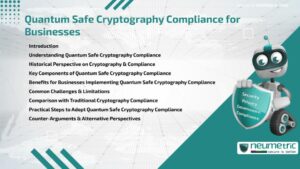Table of Contents
ToggleIntroduction
Quantum Safe Cryptography Compliance refers to frameworks & guidelines that help Businesses secure their digital infrastructure against Potential Threats posed by Quantum Computing. Traditional Cryptographic methods, such as RSA or ECC, are vulnerable to Quantum Algorithms that can break their Security foundations. By adopting quantum Safe Cryptography Compliance, Businesses can safeguard Sensitive Data, meet emerging Regulatory Requirements & maintain Customer Trust. These frameworks combine technical safeguards with Compliance measures to ensure Businesses remain prepared for the Quantum era.
Understanding Quantum Safe Cryptography Compliance
At its core, Quantum Safe Cryptography Compliance involves the adoption of Cryptographic Algorithms & Protocols that are resistant to attacks from Quantum Computers. This includes Post-Quantum Cryptography [PQC] Standards, secure Key Management & Compliance Policies that mandate migration away from vulnerable systems. Much like Safety Codes in construction protect buildings against natural disasters, these Compliance frameworks protect Organisations from Quantum-level Threats while maintaining Regulatory assurance.
Historical Perspective on Cryptography & Compliance
Cryptography has evolved for centuries, from simple Substitution Ciphers to modern Public Key Systems. Compliance frameworks such as ISO 27001, PCI DSS & HIPAA enforced structured Data Security practices during the Digital Revolution. However, advances in Quantum Computing introduced new Risks by threatening the foundations of widely used Cryptographic Algorithms. In response, National Institutes like the National Institute of Standards & Technology [NIST] began standardising PQC Algorithms. Quantum Safe Cryptography Compliance thus emerged as a bridge between historical Security frameworks & the upcoming demands of the Quantum Computing landscape.
Key Components of Quantum Safe Cryptography Compliance
Quantum Safe Cryptography Compliance frameworks generally include:
- Post-Quantum Algorithms: Adoption of standardised PQC Algorithms recommended by NIST or other Authorities.
- Key Management: Secure generation, distribution & storage of Cryptographic Keys.
- System Migration: Phased replacement of legacy Cryptographic Systems with Quantum-resistant alternatives.
- Regulatory Alignment: Adherence to Data Security Regulations updated to address Quantum Threats.
- Audit & Monitoring: Continuous evaluation to ensure Compliance & detect weaknesses.
Together, these components create a strong shield against Quantum-related Risks while ensuring Legal & Operational Accountability.
Benefits for Businesses Implementing Quantum Safe Cryptography Compliance
Businesses implementing quantum Safe Cryptography Compliance enjoy several benefits:
- Future-Readiness: Preparing for the eventual rise of Quantum-enabled Threats.
- Regulatory Assurance: Staying ahead of Compliance updates by Regulators worldwide.
- Data Integrity: Ensuring Sensitive Information remains Confidential & Untampered.
- Reputation Protection: Demonstrating responsibility & foresight to Customers & Stakeholders.
- Operational Continuity: Reducing Risks of sudden disruption by proactively transitioning to safer Systems.
Much like upgrading from Analog to Digital Systems in Telecommunications, Businesses adopting Quantum Safe Compliance gain Resilience & long-term Trust.
Common Challenges & Limitations
Adopting quantum Safe Cryptography Compliance comes with its share of difficulties:
- Limited availability of mature PQC Algorithms until Standardisation is complete.
- High costs of migration from legacy Systems.
- Compatibility challenges across Global Infrastructures.
- Lack of skilled Professionals trained in both Cryptography & Compliance.
These hurdles emphasise the need for incremental adoption strategies & International Collaboration.
Comparison with Traditional Cryptography Compliance
Traditional Compliance frameworks ensured Businesses followed Best Practices for securing Data using Algorithms like RSA & ECC. While effective for decades, these methods cannot withstand Quantum Attacks. Quantum Safe Cryptography Compliance builds upon traditional approaches by incorporating PQC Standards & anticipating future Threats. Unlike older Compliance regimes that focus on Classical Risks, these new frameworks provide Organisations with a forward-looking shield against Quantum Vulnerabilities.
Practical Steps to Adopt Quantum Safe Cryptography Compliance
Businesses can begin implementing quantum Safe Cryptography Compliance through the following steps:
- Assessment: Evaluate existing Cryptographic Systems & identify vulnerable points.
- Policy Development: Create Compliance Policies that mandate adoption of PQC Algorithms.
- Pilot Migration: Test Quantum-resistant solutions in non-critical Systems before full rollout.
- Employee Training: Educate Teams on Quantum Risks & new Compliance measures.
- Continuous Review: Regularly update Compliance Programs in alignment with NIST & other Standards Bodies.
Counter-Arguments & Alternative Perspectives
Some Critics argue that Quantum Safe Cryptography Compliance is premature since large-scale Quantum Computers are not yet available. They suggest Businesses should prioritise improving Classical Security practices instead. However, Proponents highlight that migration to PQC is a lengthy process & early adoption avoids sudden disruption once Quantum Computing becomes a reality. The debate underscores the balance between proactive investment & immediate Operational priorities.
Conclusion
Quantum Computing poses unprecedented Risks to Digital Security. Quantum Safe Cryptography Compliance provides Businesses with structured frameworks to secure Sensitive Data, align with Regulatory Standards & build long-term Trust.
Takeaways
- Quantum Safe Cryptography Compliance prepares Businesses against Quantum-enabled Attacks.
- It combines PQC Standards, Migration strategies & Regulatory Alignment.
- Benefits include Data Integrity, Reputation Protection & Operational Continuity.
- Challenges include high Costs, lack of Expertise & Compatibility issues.
FAQ
What is Quantum Safe Cryptography Compliance?
It is the adoption of Frameworks & Standards that ensure Businesses use Cryptographic methods resistant to Quantum Attacks while staying compliant with Regulations.
Why is quantum Safe Cryptography Compliance important for businesses?
It helps protect Sensitive Data, ensures Regulatory readiness & builds long-term Trust by preparing for Quantum Computing Risks.
How does quantum Safe Cryptography Compliance differ from traditional compliance?
Traditional Compliance relies on Algorithms like RSA & ECC, while Quantum Safe Cryptography Compliance uses PQC Algorithms designed to withstand Quantum Attacks.
What challenges do businesses face with quantum Safe Cryptography Compliance?
Common challenges include Migration costs, Compatibility issues & shortage of Experts in PQC & Compliance.
Who develops standards for quantum Safe Cryptography Compliance?
Organisations like the National Institute of Standards & Technology [NIST] & International Standards Bodies lead the development of PQC Standards.
Can Small Businesses adopt quantum Safe Cryptography Compliance?
Yes, Small Businesses can start with gradual adoption, focusing on high-value Data & Systems while seeking external guidance.
When should businesses start preparing for quantum Safe Cryptography Compliance?
Experts recommend starting now, as transitioning from legacy Systems to PQC takes years & cannot be done instantly.
Need help for Security, Privacy, Governance & VAPT?
Neumetric provides organisations the necessary help to achieve their Cybersecurity, Compliance, Governance, Privacy, Certifications & Pentesting needs.
Organisations & Businesses, specifically those which provide SaaS & AI Solutions in the Fintech, BFSI & other regulated sectors, usually need a Cybersecurity Partner for meeting & maintaining the ongoing Security & Privacy needs & requirements of their Enterprise Clients & Privacy conscious Customers.
SOC 2, ISO 27001, ISO 42001, NIST, HIPAA, HECVAT, EU GDPR are some of the Frameworks that are served by Fusion – a SaaS, multimodular, multitenant, centralised, automated, Cybersecurity & Compliance Management system.
Neumetric also provides Expert Services for technical security which covers VAPT for Web Applications, APIs, iOS & Android Mobile Apps, Security Testing for AWS & other Cloud Environments & Cloud Infrastructure & other similar scopes.
Reach out to us by Email or filling out the Contact Form…





